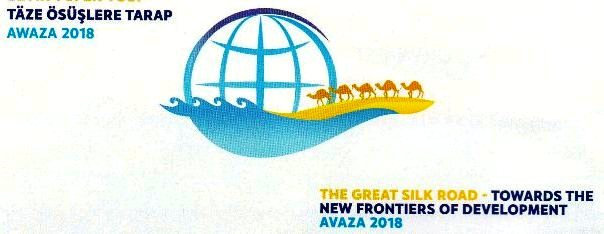
nCa Report
Awaza-Turkmenbashy (Turkmenistan), 2 May 2018 (nCa) — The holistic approach that is woven into all the policies and initiatives of Turkmenistan was on display at the Caspian seaside Wednesday when President Berdymuhamedov moderated the opening session of an international forum and led the commissioning ceremony of the Turkmenbashy Port.
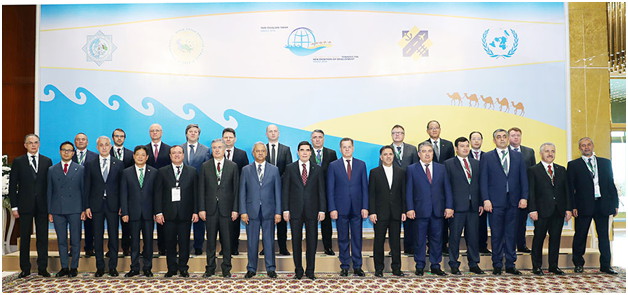
The forum was built on the theme ‘The Great Silk Road – Towards the New Frontiers of Development.’
The fact that Turkmenistan treats the development of the transport and transit sector as a unified concept was evident from the fact that President Berdymuhamedov did not deliver a separate speech at the opening ceremony of the Turkmenbashy Port. His remarks at the opening and closing of the inaugural session of the forum earlier in the day, and his comprehensive speech to the forum participants, were meant to merge with the opening of the port as an integral element of Turkmenistan’s global drive to revive the ancient Silk Road.
In his speech, covering all the areas of promotion and development of the transport and transit concepts, the Turkmen president underlined the importance of connectivity in all directions. It was simultaneously a policy statement and a picture of the current state.
The translation of the keynote address of President Berdymuhamedov is included in this report.
* * *
The theme of the conference – The Great Silk Road – Towards the New Frontiers of Development – and sharing of stage with the president of FIATA were meant to highlight the fact that the fast and unhampered movement of cargo is the currency of the new era. The revival of the Great Silk Road, as envisioned by Turkmenistan, is based on creation of conditions for the quick and affordable movement of cargo between the countries and regions of the world.
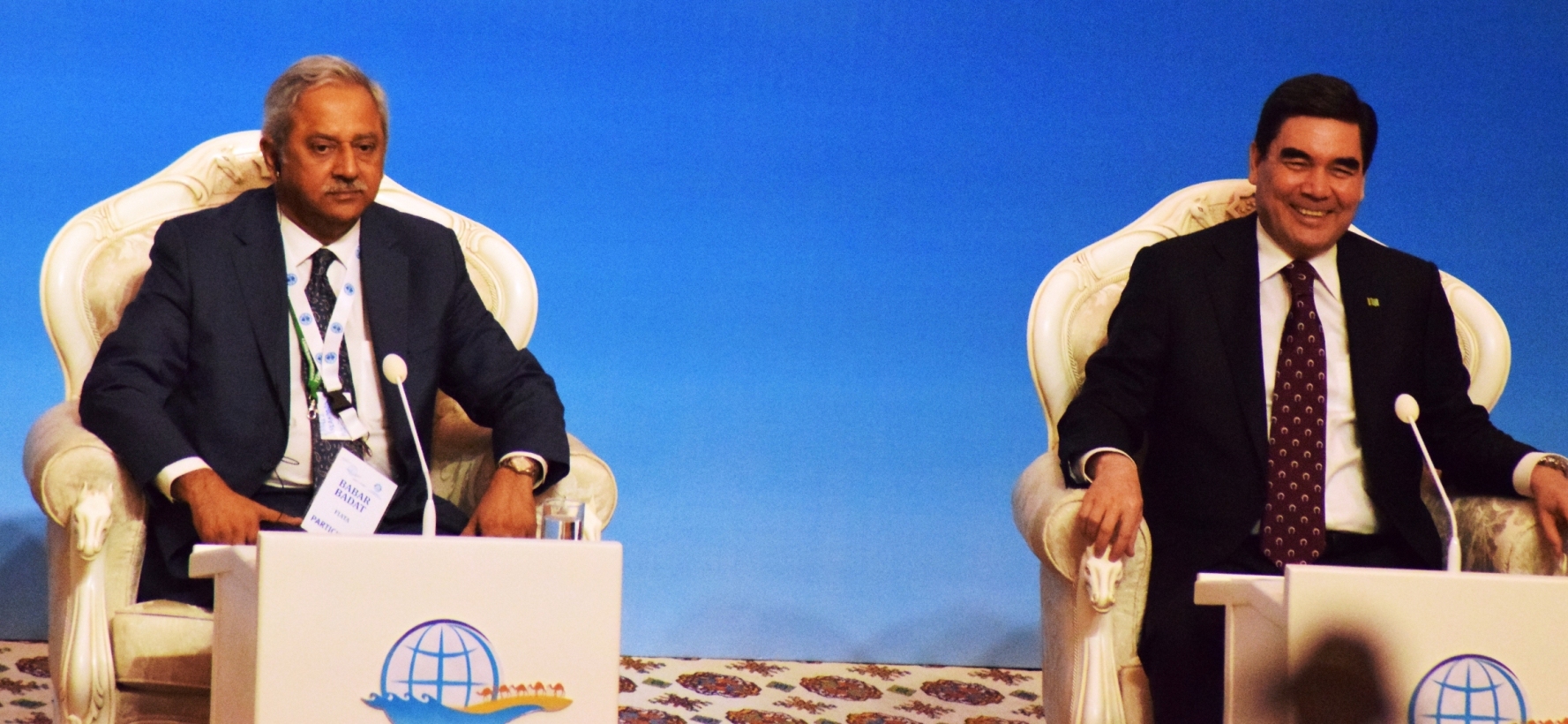
The fact that a number of countries sent high level delegations to the forum, including Turkey, Uzbekistan, Pakistan, Iran, Russia, Kazakhstan, and others, underlines that growing awareness that connectivity is not a matter of competition or selective exclusion or inclusion. The policymakers around the world are increasingly embracing the fact that connectivity has its own logic and its own flow, and resisting it is counter-productive.
In all, there were 26 delegations of ministerial or equivalent level, and representatives of a number of international and regional organizations.
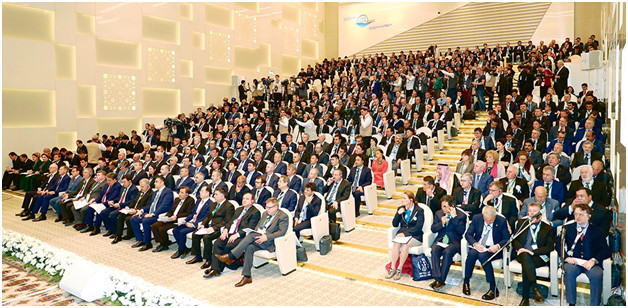
* * *
In one of his remarks at the conference, President Berdymuhamedov brought up TAPI (Turkmenistan-Afghanistan-Pakistan-India gas pipeline project).
He said, “I want to mention something very relevant today.”
He said, “TAPI is not just Turkmenistan’s project. It is our common project.”
“Many countries are interested to join [TAPI] in different capacities,” he said.
The Turkmen leader said, “Once again, I invite all of you . . . if anyone is interested in the implementation [of TAPI].”
He added for context, “Today, Afghanistan must be a part of all the major projects.”
His concluding sentence on the subject drew great applause – “War does not win anything. Only thing that can win is brotherhood and stability.”
* * *
Ever the proponent of green way of life, Berdymuhamedov said at the end of the inaugural session of the forum, “I need to ask you for a huge favour.”
He said that if you can find time, please go to the bank of the manmade river in Awaza and spend about 15 minutes just breathing the fresh and rejuvenating air.
“You will feel the difference,” he said.
* * *
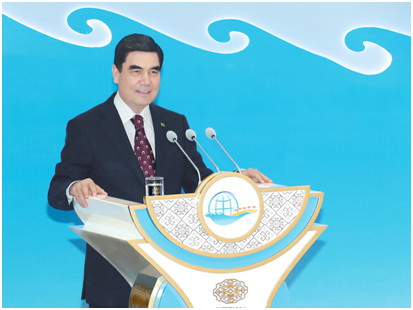
Here is a slightly summarized and paraphrased translation of the speech of President Berdymuhamedov at the forum:
We are sincerely glad to see here high-ranking representatives of many states, ministers, heads of international organizations, prominent diplomats, political and public figures from different parts of the world. With good reason, we consider such a broad participation as a sign of respect for Turkmenistan, an indicator of the community of our thoughts and aspirations. On behalf of the people of our country I say: “Welcome!”.
The idea of convening this International Forum did not come about by chance. We proceeded from the premise that it was time to carefully and seriously study the significance of the revival of the Great Silk Road in this century, to analyze the colossal opportunities that it opens for the development, the progress of dozens of states of the world, hundreds of millions of people.
Today the Great Silk Road is not just a transport route between certain geographical areas. I am convinced that this concept acquires the most important political, humanitarian, worldview dimension. Especially in modern conditions, against the background of those complex, at times, painful processes that we observe. The Great Silk Road is designed to connect the East and West, Asia and Europe, the peoples inhabiting these continents, on the principles of mutual respect, equality, trust, promote mutual understanding and openness.
“Turkmenistan is the heart of the Great Silk Road” – this is motto of our country in 2018. And this is not accidental. For many centuries the territory of Turkmenistan was a crossroads of the Eurasian ways, a meeting place of cultures, civilizations, traditions and customs.
This heritage was organically received by the Turkmen people, entered into its worldview, and now, at a new stage in its history, we are reviving the enduring values of the Great Silk Road, its beneficial influence on the formation and development of our young state, its relations with other countries.
We do it together with our friends and like-minded people all over the world. Evidence of this was the wide and genuine interest that was shown to the work of this International Forum. We are convinced that in its course a truly professional and competent conversation will take place, designed not only to draw attention to the stated topic, but also to provide answers to many of the questions on the international agenda today, where transport issues are objectively put forward as priorities.
The topics to be discussed during the forum are of great practical importance in the context of current trends in world development. Global challenges now directly affect all countries and regions, have a serious impact on the political and socio-economic situation.
In this respect, the recognition by the world community of the common goals of development, the understanding of the need to jointly confront the present challenges and threats, the readiness to implement practical steps in this direction are today the main condition for the stability of the whole system of international relations. This is especially true for our region, which is rapidly moving to the category of key components of world politics.
We are convinced that there is growing awareness in the world of the need to unite efforts to solve global problems in the transport sphere and readiness for such cooperation. In this context, we highly appreciate that the world community supports Turkmenistan’s steps in this regard.
In the international global interaction, a qualitatively new direction is increasingly asserted: transport diplomacy, one of the founders of which was Turkmenistan, which initiated a substantive multilateral dialogue on this issue within the framework of the UN and other international organizations.
In this hall people are gathered who are aware of the importance of international cooperation in the transport sphere, professionally assessing its directions and prospects. I have no doubt that in the course of the Forum’s work, modern approaches that are appropriate to objective realities and needs will be formulated, future plans are planned, and new opportunities are presented. I am confident that the substantive dialogue dedicated to the role of the Great Silk Road is designed to promote better mutual understanding of states, bringing together positions, developing innovative schemes and models of partnership interaction for the long term.
Cooperation, trust, mutual respect – these principles underlie the international activities of Turkmenistan. Our country is open to any constructive ideas and proposals, and is always ready for a substantive and interested dialogue with other states and international structures.
Forming its approaches to the important topics that are to be discussed today, Turkmenistan, first of all, proceeds from the vision of Central Asia as an integral and important link in the Great Silk Road.
Due to a number of historical, geopolitical, economic factors, this region plays and continues to play a special role not only in continental, but also in global processes. And from what will be [the role and direction of] Central Asia, what trends will become decisive and dominant, the vector of the development of the entire world politics in the foreseeable future largely depends.
Therefore, we are convinced that the revival of the Great Silk Road cannot be imagined without Central Asia. It is for these lands that for centuries passed caravan routes connecting civilizations and it was here that a natural bridge between East and West formed, which became the center of inter-civilization dialogue. Our task is to revive this historical destiny of Central Asia under new conditions and on modern principles.
Obviously, one of the most important directions in the realization of these goals is the successful integration of Central Asia into international relations, the creation of an appropriate transport, transit and communication system.
We are talking about the construction of an extensive, complex, combined transport and transit infrastructure that covers the continental Eurasia with access to the sea terminals of the Black Sea and Baltic regions, South and South-East Asia, and the Middle East.
This project also implies the prospect of connecting to the transport infrastructure in the southern and eastern directions with access to such powerful economic centers as China, India, Pakistan, the countries of the Asia-Pacific region. This means the creation of a new, even larger format of cooperation, an example of genuinely innovative thinking in global geo-economics, a vision of the strategic prospects for its development.
Naturally, given the uniqueness of the geographical location of our country at the crossroads of routes along the line North-South, West-East, the development of transport infrastructure is one of the unconditional priorities of the state policy of Turkmenistan. According to the “National Program of Socio-Economic Development of Turkmenistan for 2011-2030”, Turkmenistan is defined as the transcontinental economic bridge between the European, Asian-Pacific and South-Asian economic systems. The basic element of the long-term program is the advanced development of the transport and communication complex that can fully meet the needs of the economy and the population in transport services.
It outlines the main tasks of the development of the country’s transport system and the mechanisms for their implementation.
Among the most important tasks is the consistent integration of the transport system of Turkmenistan into the world transport system, further expansion of the national infrastructure along the main roads, connecting routes and nodes in the East-West and North-South directions.
Along with this, it is envisaged to implement measures to ensure the maximum efficiency of transport routes, reduce the share of the transport component in the cost of final products in domestic, transit and export-import communications. One of the expected results of implementing this strategy is the creation of a network of transport and logistics intermodal transport centers.
New transport corridors allow expanding the market of services in this area. That, in turn, requires an active marketing foreign economic policy, optimization of tariffs with the countries participating in international transport corridors and a flexible system of tariff preferences. Today in Turkmenistan, unique engineering structures – railway and automobile bridges, designed to become the “golden link” of the international network of transport communications are being put into operation and new, world-class airports are being built.
The development of Turkmenistan’s naval fleet and all relevant infrastructures is of strategic importance. Its most important component was the construction of the International Seaport of the city of Turkmenbashi, launched in August 2013. Today it is successfully completed.
The scale of this structure cannot be overestimated. The project of a new International Sea Port with an area of about 152 hectares envisages the construction of ferry, passenger and cargo terminals. The total length of berths, which can simultaneously serve 17 vessels, is more than 1800 meters. The port will be able to service 300,000 passengers and 75,000 trucks and transport 400,000 containers a year.
The total throughput capacity of the new port is 17 million tons of cargo excluding hydrocarbon products. Control over the movement of vessels in the water area of the port, loading and unloading operations will be carried out using satellite, automated systems.
Along with the facilities of the Turkmenbashi International Sea Port, the shipbuilding and ship repair plant Balkan [shipbuilding and repair yard] was also built. This plant, which has the capacity to handle 12,000 tons of steel per year, is designed to build 4 vessels and repair 20 vessels.
The new sea port is intended to become the most important link in the formation of a modern system of sea transport, creating the most favorable conditions for access to the Black Sea area, the countries of Europe, the Middle East, South Asia and the Asia-Pacific region, making it possible to significantly reduce the distances and travel time for large-scale cargo flows, a qualitatively new level of economic and trade cooperation between the countries of Asia and Europe.
This opens up huge opportunities for optimizing transport flows on the Eurasian space; a new strategic perspective is attached to interregional and intercontinental ties. Of course, the decision to build the port was dictated, first of all, by internal needs. The west of Turkmenistan, the Caspian coast is one of the most dynamically developing regions of our country.
A powerful industrial, energy, transport and communication infrastructure is being created here, the foundation of a modern gas chemical industry has been laid. Our goal is to give a powerful impetus to the further dynamic growth of the entire national economy through the construction of modern port infrastructure, to attract investment in its various segments. This corresponds to our strategic priorities for transforming Turkmenistan into a modern industrialized country.
At the same time, and this need to be emphasized today, the significance of the seaport in the city of Turkmenbashi goes far beyond the national framework. In making the decision to build, we proceeded from the fact that it will naturally be oriented to stimulating international partnership in the transport and logistics sphere, including new spaces and directions in its configuration.
The logic of our actions led us to the need to create such a transport communication system that would ensure effective access to foreign markets to other states of the region, open additional opportunities for expansion and optimization of partnership on the continent.
As part of improving the legal framework and bringing it in line with international standards, the Code of Merchant Marine Navigation of Turkmenistan was adopted. Our country also joined several International Conventions regulating the issues of merchant shipping at sea.
As I said, the construction of the new Turkmenbashi port is not just a large-scale and economically sound national project. Using its potential opens up opportunities for a significant expansion of multilateral cooperation in the economy, trade, and investment. In fact, with the commissioning of this facility in western Turkmenistan, in the strategically important Caspian region, a large bridgehead is being created to enhance interregional cooperation, increase the volume and quality of inter-Caspian traffic, and a new configuration of traffic flows is being formed.
I cannot but mention the environmental component of this project. At all stages of the work, it was for us an unconditional priority, and today I can say with all responsibility that the new International Port of Turkmenbashi meets the highest standards and standards of environmental safety.
In addition to the economic and commercial validity of the project, and environmental parameters, one should not forget about its geopolitical significance. I am convinced that the functioning of the new port of Turkmenbashi will have a great positive impact on the political situation in the region and beyond, will promote cooperation of the Caspian states on a variety of topical political issues, and will give additional stability to the whole system of continental interstate relations on the principles of trust and balance of interests.
In this context, it clearly fits into Turkmenistan’s international strategy, the basic and unchanging principle of which is the diversification of transport flows. We are convinced that it is the multivector model, the creation of new routes and directions that can give the necessary stability and new dynamics to global development, which is especially important against the background of those complex and sometimes crisis phenomena that we see today in the world economy.
With the launch of the new Turkmenbashi port, additional prospects for cooperation with international and regional structures are opening up. We are ready to discuss its various aspects and directions with partners from the Shanghai Cooperation Organization [SCO], the Commonwealth of Independent States [CIS], the Organization for Economic Cooperation [ECO]. We invite these respected structures for close interaction in order to maximize the use of the opportunities that have been opened.
We see good prospects for the use of the port of Turkmenbashi by the countries of our region that have no access to the sea. We are ready for substantive negotiations with them on all aspects of cooperation.
As is known, when considering the issues of cooperation in the transport and logistics sphere, Turkmenistan attaches special importance to the active participation of the United Nations in this work. Going to the UN level with the initiative of a global dialogue on transport issues, we proceeded from the fact that today it is directly linked to the implementation of the goals of sustainable development [SDGs]. To create a modern transport architecture oriented to solving the key tasks of the Community of Nations in the 21st century, serve millions of people around the world, save and increase the planet’s resources – this is today the alpha and omega of all international activities of our country in the transport segment.
Responsibly approaching this problem, Turkmenistan in recent years has put forward a number of important initiatives that have caused understanding and support throughout the world. This is evidenced by the unanimous adoption of the Turkmen drafts of the UN General Assembly resolutions on cooperation in the field of sustainable transport, co-authored by dozens of countries. Taking this opportunity, I would like to express to the leaders of these countries, many of whom are represented in this room, the most sincere gratitude.
Speaking about the development of the international transport infrastructure, we always emphasize the need for closer cooperation and partnership with specialized UN structures, primarily the United Nations Economic Commission for Europe (ECE) and the United Nations Economic and Social Commission for Asia and the Pacific (ESCAP).
In this context, Turkmenistan proposes, on the basis of the experience of the International Road Transport Union [IRU], ECE and ESCAP, to discuss the possibility of creating a Model Highway for Central Asia with access to Turkey. The initiative of the International Road Transport Union on the Model highway fully corresponds with our vision of the prospects for the development of transport routes in this direction.
We fully support it and are ready to play the most active role and provide the most effective support for the implementation of this project. We invite all UN member states, members of the ECE and ESCAP, to join in a substantive discussion of this issue.
We call for activating within the framework of these organizations discussion of various aspects of the construction of the transport corridor Afghanistan-Turkmenistan-Azerbaijan-Georgia-Turkey.
We are also ready to act as an active partner and participant in the TRACECA program. In general, we are convinced that the formation of the Western transport corridor from Central Asia is of great importance in the context of realizing the ambitious goals of reviving the Great Silk Road and connecting the two world economic poles of Eurasia on qualitatively new criteria.
We have always stated with conviction our readiness to use our richest resource base, infrastructure, and the benefits of geographical location in the interests of the international economic, trade, investment partnership, the formation of new configurations and models of cooperation in Eurasia that meet the objective needs of modern development. The construction of the International Port of Turkmenbashi has become a real and significant contribution of Turkmenistan in this process.
I thank the Turkish designers, engineers, builders, all who contributed to the implementation of this project, for their selfless work. I express my gratitude to the representatives of foreign countries and companies who are here for their contribution to the successful completion of the project.
I congratulate the Turkmen people, our dear foreign guests, on this event. I am confident that the new port will become an important link in the Great Silk Road, a gateway between two continents, widely open to equal, effective and mutually beneficial international cooperation for many decades.
I wish you all good health, prosperity, success in your work.
* * *
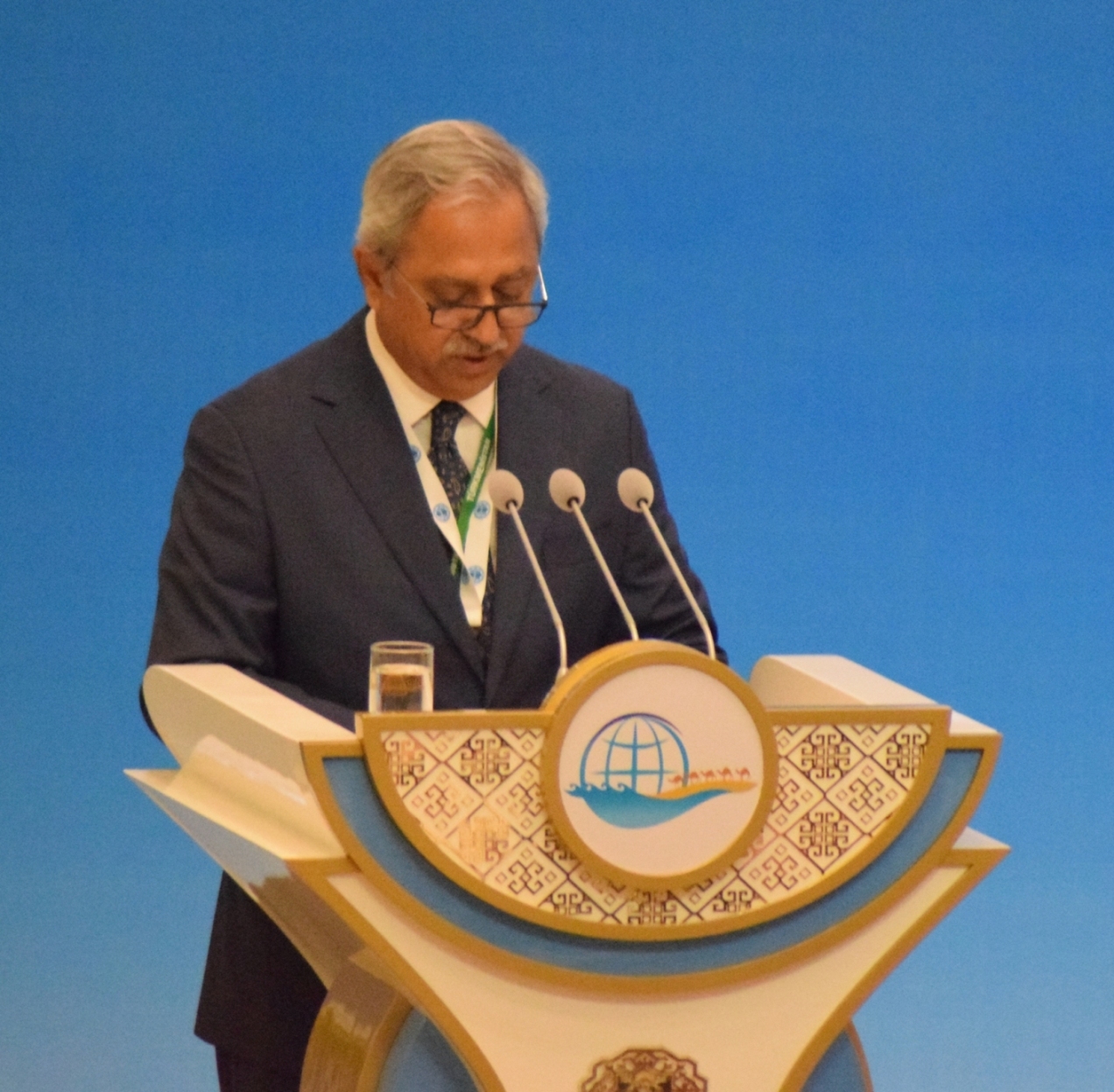
Main points of the speech of Babat Badat, president of FIATA
- Turkmenbashy Port has great importance in the context of the enhancement of partnership between the countries of the entire region. It also embodies high level of construction and equipment.
- The port, as a part of the reconstruction of the Great Silk Road, will serve as a bridge, connecting Europe and Asia.
- FIATA is ready to promote cooperation in the field of cargo transportation among the FIATA member states.
- The policy of Turkmenistan on development of transport sphere strengthens its position as the International Logistics Center. The construction of the Kazakhstan-Turkmenistan-Iran railway, projects to modernize the road network, including the construction of the Ashgabat-Turkmenbashi high-speed highway, testify to the implementation of plans to increase the transport infrastructure in the East-West and North-South directions.
- FIATA supports the initiative of Turkmenistan for the revival of the Great Silk Road, and is interested in joint work and exchange of experience in this direction which has great prospects.